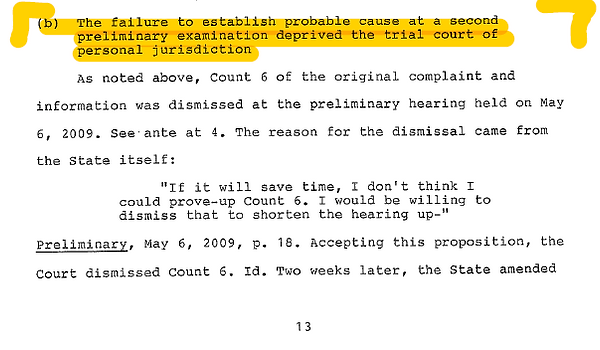
Point #2: No probable cause
"No probable cause for the count was ever factually found on the record."
This is as straightforward as it sounds.
There was never any probable cause found for the charge for which Martell was ultimately tried and convicted. Unfortunately, this is despite the fact that probable cause must be established at one's preliminary hearing in order for the circuit court to bring a count to trial.
Rachel Ritacco Testimony
In 2008, Rachel Ritacco, who was also accused of participating in the crime, was interviewed by a detective (Schlitz). Rachel asserted that she did not remember going to downtown Milwaukee to the Italian Fest grounds on the evening of the crime. She instead asserted that she only came along to the gas station where the credit card stolen at Italian Fest was used:
"I don't remember leaving. I mean I'm not saying we didn't I just don't remember leaving between there and when Gerry came back and said-because we were sitting on the porch when we left to go to the gas station."
"My memory is that we were sitting on the porch."
~Rachel Ritacco, 2008 testimony
Here is the context of the conversation between Detective Schlitz and Ms. Ritacco:


The Point
Rachel's testimony would have been required to establish probably cause at Martell's preliminary hearing. However, she says she does not remember the event.
You can view the full interview here:
Count thrown out at Martell's Preliminary Hearing
Even though the only thing required to establish probable cause would be something as simple as linking Martell to the crime, the prosecution did not believe it had the means to do so and the count was dismissed at the preliminary hearing:
"If it will save time, I don't think I could prove up Count 6. I would be willing to dismiss that to shorten the hearing up."
~ Assistant District Attorney, Jennifer Tanck-Adams - Prelimary hearing
"I will dismiss Count 6."
~ The Court - Preliminary hearing



The Point
In order to be tried for a criminal charge, probable cause must be established at the preliminary hearing. In Martell's case, the count was thrown out at the preliminary hearing.
Here is the full transcript of the preliminary hearing with key sections highlighted:
Trial Court is outside of its jurisdiction when no probable cause exists
Martell filed a post-conviction motion in 2012 to challenge the court's ability to criminally try him since there was no probable cause in the first place. Here is that detailed explanation written by Martell himself:
"The failure to establish probable cause at the second preliminary examination deprived the trial court of personal jurisdiction."
~Post-conviction Motion, 2012





The Point
When no probable cause exists at the preliminary hearing, it is illegal for the court to take someone to trial for a criminal charge.
Here is the full transcript of post-conviction motion:
Probable Cause must be present in any multiple-count case
One might think that perhaps as long as probable cause exists for some of the charges against someone that any number of counts may be brought to trial. However, this is very clearly not the case.
Per State v. Williams (1994), probable cause must be established for every "transactionally distinct" count in any multiple-count case at the preliminary hearing.
In Martell's appeal motion entitled "Collateral Attack" in 2014, he explains why existing Wisconsin law requires that in his circumstances, probable cause must be established for each count in a multiple-count situation:


The Point
Probable cause must be established for every count in a multiple-count case like Martell's.
Here is the relevant excerpt from Martell's Collateral Attack document filed with the state of Wisconsin:
Conclusion
The courts have clearly established that all charges must be supported by probable cause for every distinct count at a preliminary hearing before a trial can take place.
Martell never had any probable cause established at his preliminary hearing and was therefore robbed of his constitutional right.

